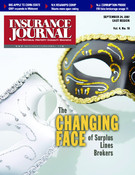No evidence found to support charges of a global conspiracy among commercial brokers and insurers
Finding the charges lack any factual support, a federal judge has dismissed a big antitrust conspiracy case that was lodged against large commercial insurance brokers and insurers back in 2004 when bid rigging and account steering probes were in full sway.
In dismissing the antitrust complaint for the second time, Chief Judge Garrett E. Brown Jr. of the U.S. District Court for New Jersey said the plaintiffs had no proof that there was any sort of conspiracy among insurers and brokers to secretly allocate accounts, refrain from competing, or pay incentive bonuses on certain commercial accounts.
The plaintiffs alleged that the defendants had engaged in both a global conspiracy and so-called “hub and spoke” conspiracies in which brokers acted as hubs to coordinate illegal distribution of commercial insurance accounts among insurers (the spokes).
Defendants in the suit that have now been cleared of federal antitrust charges are some of the largest insurance companies and brokerages including American International Group, The Hartford, Fireman’s, Liberty Mutual, American Re, Travelers, Chubb, Marsh, Willis, Aon and Hilb Rogal & Hobb.
Consolidation of suits
The case was a consolidation of suits from around the country brought under federal antitrust statutes. It developed in the wake of investigations by state attorneys general including New York’s Eliot Spitzer over alleged bid rigging, account steering and improper contingent commission payments.
These consolidated lawsuits took those charges to another level claiming that they were part of a conspiracy among certain large insurers and insurance brokers and accusing the players of antitrust violations and racketeering.
Earlier this month, Brown put the antitrust conspiracy charges to rest in granting the defendants’ motions to dismiss. He had also agreed with defendants in April but gave plaintiffs one last chance to amend their complaint.
But Brown found the amended complaint was even less convincing than the earlier one. In completely dismissing the conspiracy allegations, Brown wrote:
“While this Court previously held that the conspiracy allegations were faulty because they failed to show some sort of recognizable allocation of the market (a way for the insurers
to understand what they were actually agreeing to divide), it appears that the allegations as presently drafted suffer from a more serious defect. This hub and spoke conspiracy is devoid of a factual basis for this Court to infer that an agreement existed among the competitors — in this case, the Insurer Defendants. Plaintiffs want this Court to view the specific facts regarding the ‘incumbency protection racket’ through their lens — which colors each demand from a broker to an insurer as being part of an agreement to restrain competition that already exists. However, when stepping back and viewing these facts in the aggregate, there is nothing in this record to suggest that there was any sort of express agreement among the insurers. While it is not necessary for the agreement to be explicit, the facts are simply too tenuous to intimate an implied agreement — a rim to this hub and spoke conspiracy. The brokers demanded certain behavior of the insurers, but that does not constitute a horizontal agreement among insurers to collude.”
No global conspiracy found
Brown found no evidence to support the charges of a global conspiracy among brokers to keep secret
their contingent commissions and not tell clients about them. Plaintiffs had argued that the defendants’ membership in the same trade group, the Council of Insurance Agents and Brokers, was proof. But for Brown, “membership in various trade groups and the sharing of information are insufficient to support an inference of actual concert of action.”
He wrote that since plaintiffs failed to prove that the insurer defendants colluded among themselves in the broker-centered conspiracies, “it is improbable that they colluded to further this global agreement as well.”
While this dismissal affects the antitrust complaint brought against the defendants, charges of violating federal racketeering laws are being judged separately and remain before the court.
Some insurers and brokers have settled similar antitrust complaints with officials in New York, Connecticut and other states, although they have not admitted doing anything illegal. Among those that have settled are insurance broker Arthur J. Gallagher & Co. and Zurich American Insurance Co.
Topics Carriers Legislation Agencies
Was this article valuable?
Here are more articles you may enjoy.


 California Sees Two More Property Insurers Withdraw From Market
California Sees Two More Property Insurers Withdraw From Market  Uncertainty Keeps Prices Up; No Prior-Year Loss Development: Travelers
Uncertainty Keeps Prices Up; No Prior-Year Loss Development: Travelers  Cargo Owners in Baltimore Disaster Face ‘General Average’ Loss Sharing, MSC Says
Cargo Owners in Baltimore Disaster Face ‘General Average’ Loss Sharing, MSC Says  Harvard Study Again Stirs the Pot on Demotech Ratings of Florida Carriers
Harvard Study Again Stirs the Pot on Demotech Ratings of Florida Carriers 


